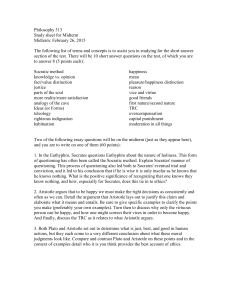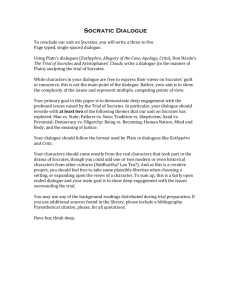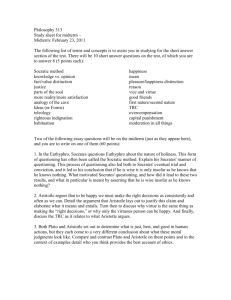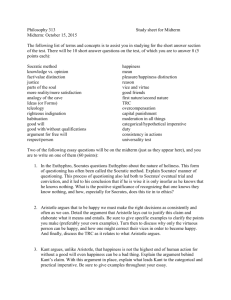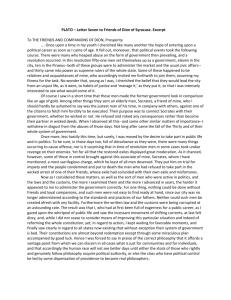Merissa Chiu, Tori Darah, Lee Ann Song
advertisement
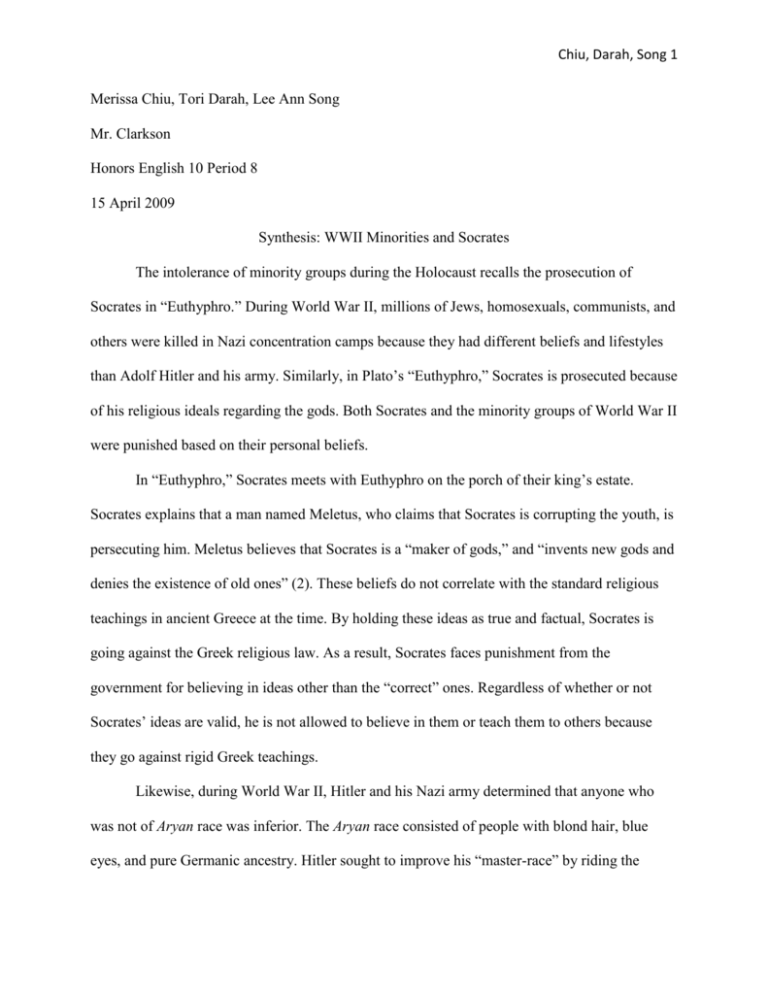
Chiu, Darah, Song 1 Merissa Chiu, Tori Darah, Lee Ann Song Mr. Clarkson Honors English 10 Period 8 15 April 2009 Synthesis: WWII Minorities and Socrates The intolerance of minority groups during the Holocaust recalls the prosecution of Socrates in “Euthyphro.” During World War II, millions of Jews, homosexuals, communists, and others were killed in Nazi concentration camps because they had different beliefs and lifestyles than Adolf Hitler and his army. Similarly, in Plato’s “Euthyphro,” Socrates is prosecuted because of his religious ideals regarding the gods. Both Socrates and the minority groups of World War II were punished based on their personal beliefs. In “Euthyphro,” Socrates meets with Euthyphro on the porch of their king’s estate. Socrates explains that a man named Meletus, who claims that Socrates is corrupting the youth, is persecuting him. Meletus believes that Socrates is a “maker of gods,” and “invents new gods and denies the existence of old ones” (2). These beliefs do not correlate with the standard religious teachings in ancient Greece at the time. By holding these ideas as true and factual, Socrates is going against the Greek religious law. As a result, Socrates faces punishment from the government for believing in ideas other than the “correct” ones. Regardless of whether or not Socrates’ ideas are valid, he is not allowed to believe in them or teach them to others because they go against rigid Greek teachings. Likewise, during World War II, Hitler and his Nazi army determined that anyone who was not of Aryan race was inferior. The Aryan race consisted of people with blond hair, blue eyes, and pure Germanic ancestry. Hitler sought to improve his “master-race” by riding the Chiu, Darah, Song 2 population of all inferiors. With this desire came the Nazi concentration camps, used to kill minority groups systematically, in mass quantities (Nazi Racism). Among the discriminated were Jews, homosexuals, communists, and other people with differing ideas. Although they were a religious group, Hitler considered the Jews as a “poisonous race which lived off the other races and weakened them.” Because their ideas and lifestyles were different from his own, they suffered endless torture and punishment (Nazi Racism). Homosexuals also faced similar consequences, merely because their beliefs did not correlate with Hitler’s. He condemned them as “socially aberrant,” and banned all gay and lesbian organizations (Homosexuals: Victims of the Nazi Era). In “Euthyphro,” Socrates presents new ideals that Meletus and the city deem as harmful to society because Socrates’ thoughts do not conform to traditional Greek teachings. In the same way, Adolf Hitler and his army believed certain groups of people were causing destruction to the “perfect” society Hitler was trying to form. Socrates, like the victims of the Holocaust, was forced to pay and suffer for his personal beliefs, even though no crime was committed. Plato presents a theme of intolerance and injustice in “Euthyphro” that is often seen in modern day conflicts. Chiu, Darah, Song 3 Works Cited "Homosexuals: Victims of the Nazi Era." Holocaust Education Resources for Teachers. Holocaust Teacher Resource Center. 14 Apr. 2009 <http://www.holocausttrc.org/homosx.htm>. "Nazi Racism." United States Holocaust Memorial Museum. USHMM. 14 Apr. 2009 http://www.ushmm.org/outreach/racism.html.


